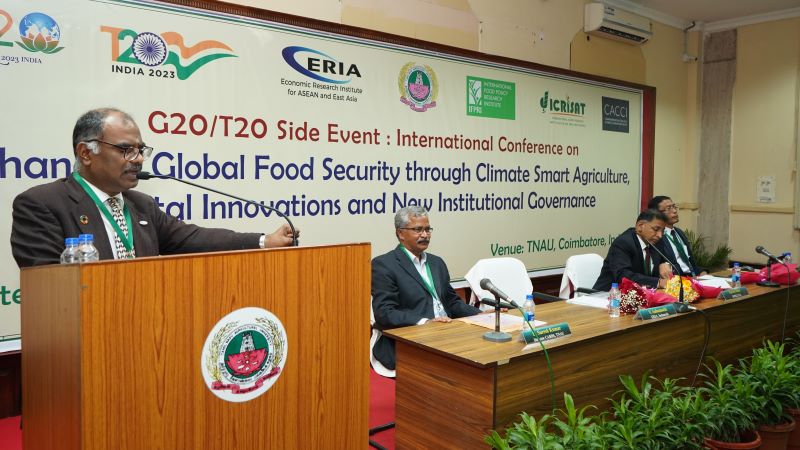ERIA-IFPRI-ICRISAT-TNAU CACCI Asia jointly-organize T20 Side Event on Enhancing Global Food Security through Climate Smart Agriculture, Digital Innovations, and New Institutional Governance
Date:
28 August 2023Category:
NewsTopics:
Agricultural Development, G20, India, T20Share Article:
Print Article:
Coimbatore, 28-30 August 2023: The Economic Research Institute for ASEAN and East Asia (ERIA), in cooperation with the Tamil Nadu Agricultural University (TNAU), the International Food Policy Research Institute (IFPRI), the International Crops Research Institute for the Semi-Arid Tropics (ICRISAT), and the Comprehensive Action for Climate Change Initiative – Asia (CACCI Asia), organized a three-day special G20–T20 side event on enhancing global food security through climate-smart agriculture, digital innovations, and new institutional governance.
The hybrid event brought together experts from government, academics, civil society, and business into inclusive consultations on G20 Agriculture Working Group recommendations, with the aim of: take an inventory of climate-smart agriculture approaches and track the progress made in implementing inclusive agriculture value chains; map the drivers and benefits of securing climate-resilient millet value chains linking producers in the global south and consumers in advanced economies; and catalyse the partnerships needed for food systems transformation under the constraints of climate change, and opportunities available through the digital revolution.
The conference consisted of a two-day workshop, plus field trips to learn climate smart agriculture practices at TNAU and the Isha Foundation. It covered four themes: millet in combating climate change and achieving food security; trends and challenges in climate smart agriculture; securing climate-resilient and inclusive value chains; and digital innovations and institutional governance for sustainable agriculture.
Forty speakers from academia and government representatives of Austria, Brazil, Australia, Japan, Indonesia, India, Cambodia, Lao PDR, and Vietnam presented key insights to address global food security challenges identified in the Outcome Document and Chair’s Summary of the G20 Agriculture Ministers’ Meeting.
Professor Suresh Kumar Devarajulu, TNAU; Dr Venkatachalam Anbumozhi, ERIA; Dr Suresh Babu, IFPRI; and Dr Victor Afari-sefa, ICRISAT; gave the opening remarks, emphasizing the need for scaling up existing solutions and best practices toward global food security. As a part of the G20 troika, Professor Budi Indra Setiawan, advisor to the Indonesian government; and Angelo de Queiroz Mauricio, Minister-Agriculture Attaché of the Brazil government; gave keynote speeches.
Prof Setiawan highlighted development projects in Indonesia which converge climate changes and food security issues, including: the Strategic Irrigation Modernization and Urgent Rehabilitation Project (SIMURP), and Climate Resilient and Low Carbon Agricultural Development in Indonesia (CRLCADI). Mauricio described how climate and ecosystem-based agriculture is implemented in Brazil, with all products produced in harmony with forests and preservation areas to safeguard food security and the preservation of natural areas, all carried out by producing more with less land. Therefore, policy actions implemented in Brazil aim to achieve sustainable agriculture, such as the Sectoral Plan for Adaptation and Mitigation in Agriculture (ABC Plan).
Fifteen papers were presented by international experts from governments, academics, businesses, civil organizations, and prominent leaders in sustainable agriculture and food security practices. For the first theme of millet in combating climate change and achieving food security, presentations were delivered by Dr Rooba Banerji, India; and Dr Shalander Kumar, ICRISAT. Moving on to trends and challenges in climate-smart agriculture, four presentations were made by: Dr Venkatachalam Anbumozhi, ERIA, Dr Kishan Kumar Kaushal, India and Dr Lai Van Manh, Vietnam; Dr Faroby Falatehan, IPB University, Indonesia, and Dr SS Sivakumar, TNAU; Dr Muniandi Jagadeesan, TNAU and Appavu Thanigan, Madras School of Economics; and Dr Kuppannan Palanisamy and Professor Suresh Kumar Devarajulu, both from TNAU. For the theme of securing climate-resilient and inclusive value chains, five presenters delivered papers: Dr Kanaka Shankar, TNAU; Shreya Kapoor, IFPRI; Dr Suresh Babu, IFPRI; Dr Vinaya Kumar, Keladi Shivappa Nayaka University of Agricultural and Horticultural Sciences, Shimoga (KSNUAHS); and Barun Deb Pal, IFPRI.
Four presentations were made on digital Innovations and institutional governance for sustainable agriculture by Professor Yamaji Eiji, the University of Tokyo; Ganesh Krishnappa, Boomitra; Professor Kaliappa Kalirajan, Australian National University; and Dr Meinhard Breiling, TU Wien.
Key takeaways from the workshop include an emphasis on the key role of millet in combating climate change and achieving food security. There was also an emerging urgency to develop a climate smart agriculture (CSA) taxonomy as a framework to consolidate diverse practices, ideas, and solutions which are currently in place, to establish sustainable agriculture and secure a resilient food value chain in the future. This is carried out by catalysing the implementation of smart agriculture through digital innovations, such as artificial intelligence (AI), and the Internet of things (IoT).
The conference concluded with a site visit to witness climate smart agriculture practices demonstrated by TNAU research centres, Mobiletech, Niagara, and Isha Foundation farms. The visit showed participants some of the prominent best practices of CSA implemented in India.
These included an IoT based irrigation automation system which allows farmers to control the water discharge from anywhere, as shown by Mobiletech; drip irrigation which helps farmers to increase the efficiency of water use, as presented by Niagara; and a TNAU speed breeding paddy which has increased harvest time from three to five times a year. Participants also learnt how to develop self-sustaining and regulating farming through natural farming practices, as demonstrated by the Isha Foundation.
ERIA, in coordination with its partners, will publish a book on the proceedings of the workshop, as one of the deliverables in support of the G20–T20 India Presidency, by December 2023.

.jpg)
.jpg)







